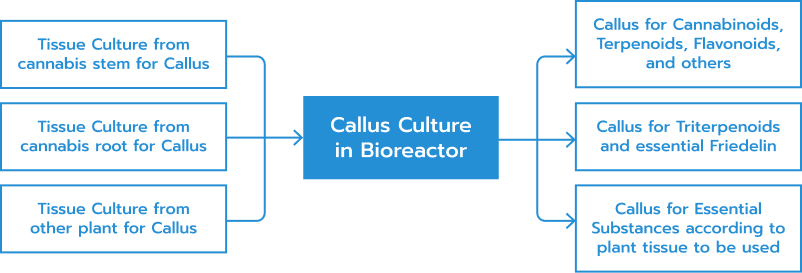Capabilities

Callus derived from natural cannabis cells has the capability to preserve and enhance a majority of essential substances found in cannabis, such as cannabinoids, terpenoids, flavonoids, and others, tailored to the specific properties of each strain. This preservation enhances the Entourage Effect, where these components interact synergistically to aid the human body in recovering and achieving balance. This cultivation process takes place within a meticulously controlled laboratory environment to ensure sanitary conditions and yield medical-grade outcomes suitable for pharmaceutical drug manufacturing.
Moreover, by regulating the THC content from the strain's original source, it becomes feasible to maintain the plant's natural spectrum and produce Broad Spectrum extracts that comply with legal regulations regarding THC limits.




The bioreactor method for cultivating cannabis callus cells involves two essential steps:
1. Multiplication of Callus Cells: This initial step focuses on increasing the number of callus cells.
2. Induction of Active Ingredient Production: The subsequent critical phase involves stimulating the callus cells to produce active ingredients.
In the case of cannabis callus cells, inducing cannabinoids is particularly significant.
To facilitate this induction process effectively, a specialized bioenhancer called RPAH Bio-Aggrandizer has been developed. This innovation was specifically designed to enhance the types and concentrations of cannabinoids produced by cannabis callus cells through the bioreactor method. Research conducted on the impact of RPAH Bio-Aggrandizer revealed that it can elevate cannabinoid contents within callus cells from approximately 20% to 30% of the dried weight under controlled bioreactor conditions.
Our current research using CES-Tech
Tissue Culture from seed Hemp var : Charlotte's Angel
We are focusing on cultivating tissue cultures derived from seeds of the hemp variety Charlotte's Angel. Through CES-Tech, we aim to produce callus cells sourced from natural cannabis cells. These callus cells have demonstrated the ability to maintain and enhance a wide range of important substances found in cannabis components, including cannabinoids, terpenoids, flavonoids, and others. The enhancement process is tailored according to the specific percentage properties inherent to each strain.

Tissue Culture from the root of Cannabis var : Thai Stick
Our research also includes tissue culture from the roots of the cannabis variety Thai Stick. Cannabis roots are known to contain Triterpenoids, Epifriedelanol, and predominantly Friedelin. Historical records from Persian, Polish, and British physicians indicate the use of cannabis roots for various medicinal purposes such as reducing inflammation, relieving pain, easing joint stiffness, treating gout, reducing fever, and promoting burn healing. Importantly, cannabis roots do not contain THC, the psychoactive compound responsible for addiction, making them relatively safe for long-term use.

These research efforts aim to advance our understanding and utilization of cannabis and hemp plants for therapeutic applications, leveraging advanced biotechnological methods to optimize medicinal and beneficial properties.
Researches in other medicinal beneficial economic value added herbs and plants
Our research extends beyond cannabis and hemp to encompass various other medicinal and economically valuable plants and herbs. We are exploring advanced biotechnological methods to enhance their therapeutic potential and economic value. Here are some examples of our current research initiatives:

The crude extract obtained from callus cells is:
- A natural oil, as it is synthesized naturally within the cells.
- Not chemically formulated.
- Non-synthetic.
- Non-GMO (non-genetically modified organism).
The advantages of CES-Tech (Callus for Essential Substances Technology) are:
- High Yield: CES-Tech enables high production yields of desired substances.
- High Quality and Clean Products: The technology ensures products of superior quality with minimal contaminants.
- Shorter Harvesting Time: Allows for shorter cultivation cycles and flexibility in determining harvesting times.
- Independence from Weather and Environmental Factors: Eliminates the dependency on natural conditions, providing consistent output regardless of environmental variations.
- Reduced Wax Content and Purer Oil: Enhances the purity of extracted oils by minimizing wax content.
- Control over Essential Substance Proportions: Enables precise control over the proportions of targeted essential substances.
- Applicability to Other Natural Products: Can be adapted for use with various medicinal plants and other natural products, broadening its applicability and potential benefits.